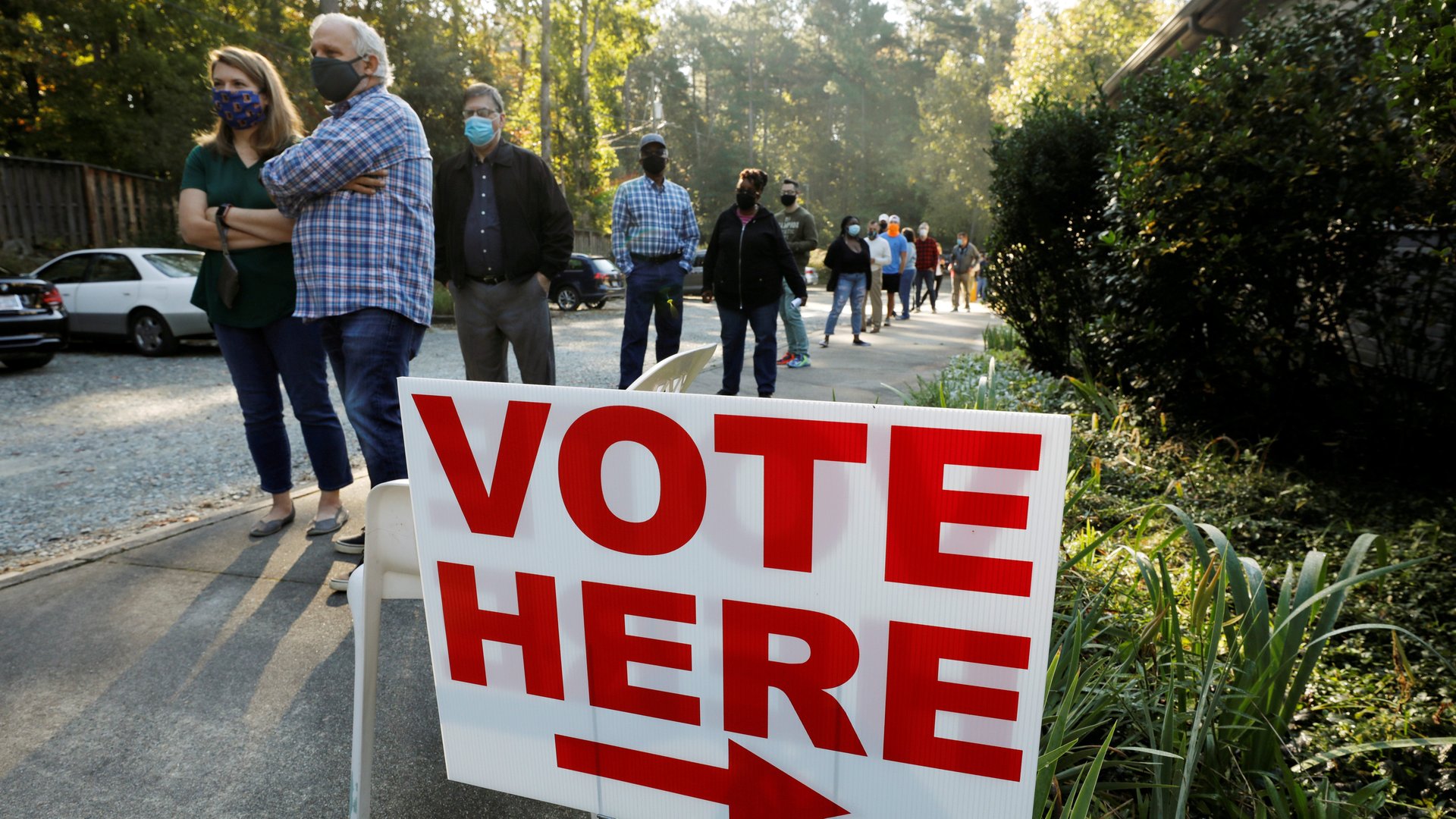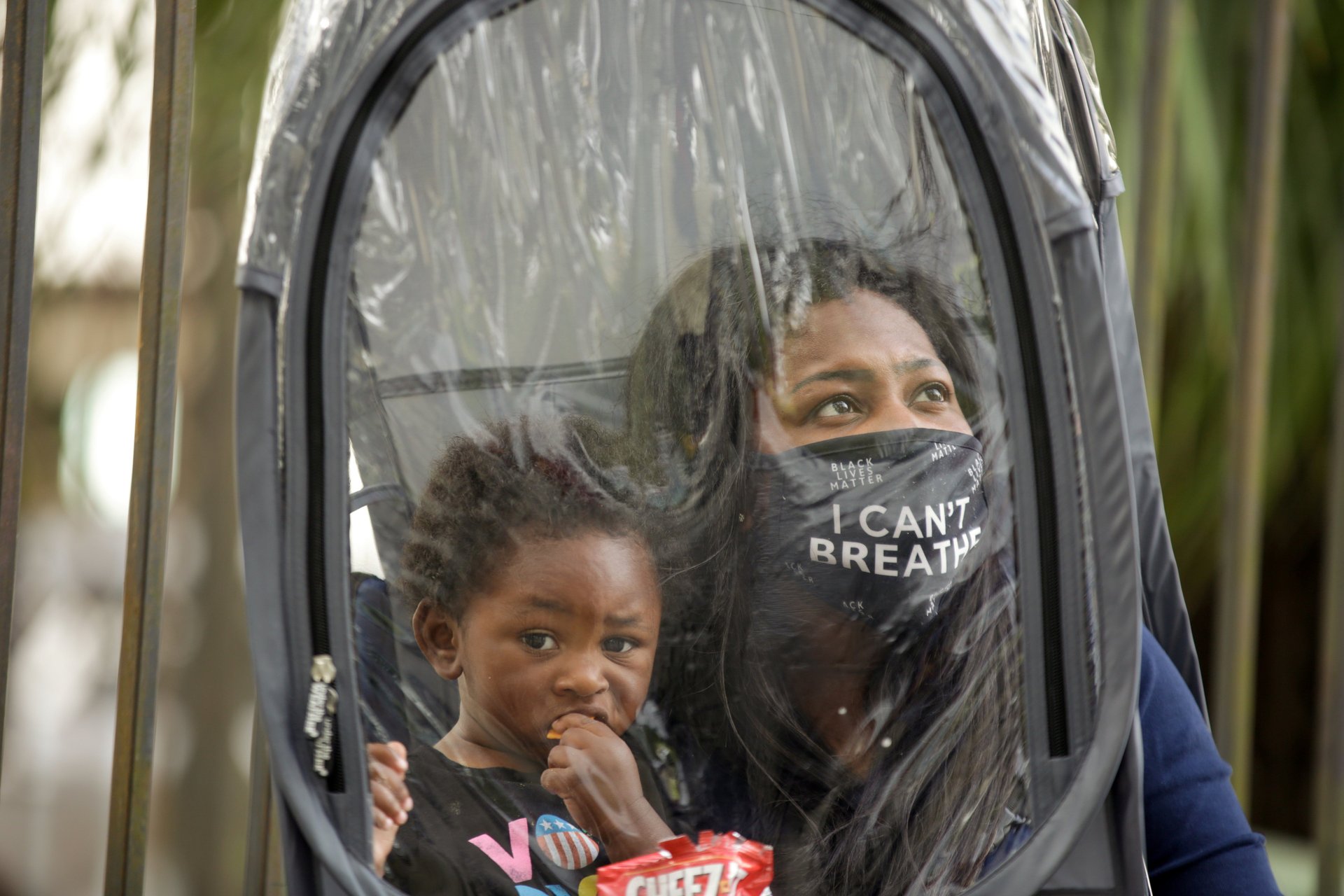What countries around the globe can teach the US about elections
As the US gears up for one of its most contentious presidential elections in recent memory, the way Americans vote has come under intense scrutiny.


As the US gears up for one of its most contentious presidential elections in recent memory, the way Americans vote has come under intense scrutiny.
From alleged foreign interference to partisan gerrymandering and voter disenfranchisement, there’s plenty of cause for concern over efforts to destabilize or skew this election. But there are also quirks in the system—such as the Electoral College and an uneven patchwork of local voting laws—that help explain why the US has one of the lowest rates of electoral participation (pdf, p. 47) in the developed world.
The faults in America’s election system have serious consequences. Mistrust over the outcome of the election is on the rise, fueled by online conspiracy theories and the inflammatory rhetoric of US president Donald Trump, who has refused to commit to a peaceful transition of power.
The simple reality is that, in many ways, the US electoral system makes it too darn difficult for Americans to vote. Heck, US astronauts can vote from the International Space Station. If some Americans can vote electronically from orbit, why not in their home precincts? Electoral systems around the world provide some useful templates to spruce up the process.
Why is voting so difficult in the US?
As Quartz has previously written, the problems with the US election system start at the bottom: Each state organizes its own voting, and elected politicians are often in charge of setting up procedures. There’s no single national standard, as in France, or a non-partisan independent agency in charge of elections, such as those that exist in countries like Canada and Mexico. Laws on what kind of identification you need for voting, for example, vary from strict (only certain kinds of photo ID) to lax (none needed at all).
The obvious temptation is to create an electoral system that favors the party of your choice. That results in allegations of vote suppression, as happened in Texas earlier this month when Republican governor Greg Abbott was sued for limiting absentee ballot drop-off sites to one per county. His reasoning for the move? Voter fraud. Except that, while documented instances of voter fraud do appear to be more frequent with mail-in ballots, they are “rare,” according to the MIT Election Science + Data Lab. As The Economist argues, “for the 4.7 million residents of Harris County, 70% of whom are non-white and liable to vote Democratic, that is a travesty.” The Texas Supreme Court, however, sided with Abbott.
In a separate case this week, the US Supreme Court confirmed that absentee ballots in Wisconsin must be received by 8 pm on election day, and that possible delays tied to Covid-19 don’t justify extending that deadline. Justice Brett Kavanaugh wrote in an associated opinion that Nov. 3 deadlines help “avoid the chaos and suspicions of impropriety that can ensue if thousands of absentee ballots flow in after Election Day and potentially flip the results of an election.”
The ruling echoes concerns broadcast by president Trump that ballots received after Nov. 3 could be fraudulent.
But partisan bickering over this issue has had at least one positive side effect—more than 70 million Americans have already voted either in person or by mail.
Americans vote with good ol’ paper ballots and that’s at least one area where they might do well to stick to their guns. There’s a good body of evidence showing that’s the safest way to protect elections. And while uncounted paper ballots turn up in closets, bags, or mail facilities more often than you’d think, faulty electronic ballot-marking machines have also led to mysteriously disappearing ballots in Tennessee and Georgia—and have we mentioned hackers? Still, it isn’t the only way; in Estonia, which admittedly is a tiny country whose elections have fewer global implications than those of the US, 44% of votes in the 2019 parliamentary election were cast electronically using the encrypted i-Voting system.
If dragging America’s electoral infrastructure into the 21st century might be a bridge too far, perhaps bringing it out of the 19th would be a good start. American elections are held on Tuesdays because that was when horse-and-buggy driving farmers could get to the county seat and back before market day. That’s not really an issue anymore. Most people can’t afford to spend a work day waiting in line to vote—and many countries that hold elections on weekends or designate election day as a national holiday, including France, Germany, Thailand, Russia, and Japan, have higher turnout than the US.
Some countries, including Brazil, Belgium, and Turkey, even have compulsory voting. But that’s difficult to enforce and political theorists disagree about whether forced participation is ideal for free democracies.
One of the reasons why US elections are so divisive and exhausting for voters is that they last way too long. Campaigning for the 2016 presidential election took almost 600 days, according to writer Emma Roller’s calculation. “In the span with which we’ve been paying attention,” she wrote at the time in The New York Times, “we could have instead hosted approximately four Mexican elections, seven Canadian elections, 14 British elections, 14 Australian elections or 41 French elections.”
Many countries set limits on the length of elections, such as Japan, where candidates can only campaign for 12 days. A parliamentary system like the UK allows for “snap” elections if two-thirds of the House of Commons agree to it or if a majority passes a motion of no confidence in the government. In the US, the long election cycles run the risk of disengaging voters, who may feel like they’re stuck in an endless loop of hyper-partisan elections. A Pew survey conducted in August revealed that roughly half of Americans found this campaign dull and too negative.
How will the pandemic affect the election?
Lest we forget what truly makes this an extraordinary election, the world is in the grips of a pandemic. In fact, this election will partially be a referendum on president Trump’s handling of the coronavirus, which has killed more than 220,000 Americans.
In spite of the pandemic, voting in person can still be safe as long as poll workers and voters respect public health guidance. Even Anthony Fauci, director of the National Institute of Allergy and Infectious Disease, says he plans to vote in person this year. But if you are not comfortable, you can still request an absentee ballot in some states—or vote early on a day when the lines aren’t as long.

The pandemic will impact the election in ways that are difficult to predict. At the risk of constantly picking on Texas, the state’s Supreme Court ruled (pdf) that the likelihood of someone contracting Covid-19 if they vote in person does not qualify as a “disability” under state laws, and therefore is not a valid excuse to request a mail-in ballot.
The dynamics that make voting, and especially voting during a pandemic, so onerous are worse on average for voters of color. Even before Covid-19 Blacks and Latinos tended to wait longer to vote. According to the polling outfit FiveThirtyEight, they “frequently have their ballots rejected at a higher rate than white votes.” These voters also appear wary of mail-in ballots: In a survey conducted by the Voter Participation Center in August, 66% of Black voters and 65% of Latino voters said they “prefer to vote in person because they think their vote is more likely to be counted.”
And yet if this election is a referendum on the US response to the pandemic then the stakes are even higher for Black and Latino people, who are more likely to contract and die of Covid-19 in the US according to the Centers for Disease Control and Prevention.
“There’s a lot of ways in which Americans can be shut out of the democratic process,” Myrna Pérez, director of the voting rights and elections program at the Brennan Center for Justice, recently told ABC News. “And what Covid has done is it has taken all of those cracks in the system and made them visible.”